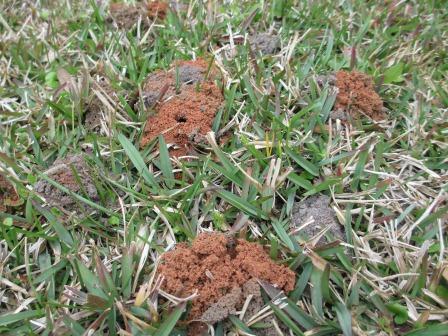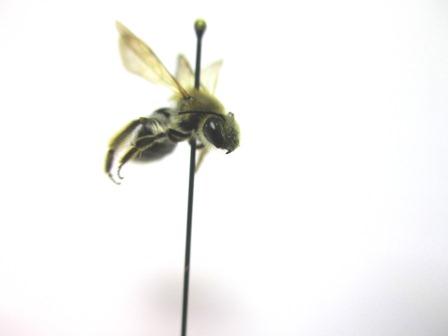
Several ground bee burrows are shown above in this Marianna lawn. Ground bees lay their eggs in borrows, from which, adult ground bees will emerge the following year. Photo taken by Josh Thomposn
The panhandle has experienced warmer weather during the past week, and as the air has warmed and the soil dried, a particular ground-dwelling insect has appeared. This insect is the ground or mining bee.
There are several different genera of ground bees, but the Andrenidae andrena species has been spotted recently in Jackson County. The A. andrena ground bee is the size of a honey bee and can be found flying only a couple feet above the ground in many lawns this time of year.
Ground bees are different from other types of bees in that they do not form colonies. Rather, individual females live in burrows in the ground. It is not uncommon to observe hundreds of burrows in a single yard.
During the spring, the bees will mate and the females will dig burrows in which they store food and lay their eggs. Once the eggs hatch, the larvae stay dormant until the following spring when they will mature and leave the nest to mate.
Ground bees are generally very docile and unlikely to attack people or animals. Generally, even activities such as raking or mowing lawns will not cause the bees to attack. However, those who are allergic to bee stings should use caution when ground bees are present.
Bees are important pollinators, and in the case of ground bees, usually do not cause problems for humans. Although the number of mounds may be unsightly in our lawns, the adult bees only live for 4-6 weeks and will not be present after that period.
If control is necessary, consider applying ample water to the infested area which will flush the bees out of the ground, causing them to move to another place to nest. For more information: Ground or Mining bees or contact Josh Thompson at the Jackson County Extension Service.
- Carinata Starting to Come Up in Jackson County - December 12, 2014
- Wheat Production Considerations for 2014-2015 - November 10, 2014
- Peanut and Cotton Harvest Video 2014 - November 10, 2014

